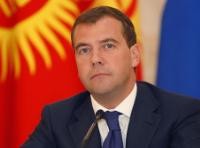With all the “he says, she says” over just how the Russia-Georgia War started, it seemed only a matter of time before a charge of American involvement was raised. For my part, I’d found it either particularly reckless or particularly suspicious that Georgian President Mikheil Saakashvili would start a war with Russia immediately following joint military exercises with American forces, and while some of the latter were still present in the country on Georgian military bases. Something tells me that the more we learn about the conflict, the more we’ll come to appreciate the voices of reason in its aftermath. […]
Russia Archive
Free Newsletter
Yesterday, in his WPR Global Insights column, Richard Weitz mentioned Russian negotiators’ insistence on limiting delivery systems and not just nuclear warheads in future strategic arms agreements with the U.S. Yesterday’s failed test launch of Russia’s Bulava sub-launched nuclear-capable missile (via DefenseNews) might explain why. It’s the fifth test launch out of ten to have failed. The Russian navy was planning on introducing the missile in 2009 had the test been successful, which at a 60 percent success rate illustrates both the urgency Russia feels to upgrade its aging nuclear arsenal and the difficulty it is having to do so. […]

On Dec. 20, Russian Deputy Foreign Minister Sergei Ryabkov complained that the Bush administration’s insistence on limiting the number of operational nuclear warheads, instead of the number of strategic bombers and missiles capable of delivering them, was the “main problem” preventing a new Russian-American strategic arms control agreement. The question of how to treat long-range strategic delivery systems equipped with conventional warheads, and the extent to which they should be limited by any new arms control agreement, continues to separate the American and Russian negotiating positions. U.S. officials have been seeking an accord that provides both Washington and Moscow with […]
One of the major criticisms leveled by skeptics in the COIN vs. Conventional debate has been that the focus on COIN training needed for deployment to Iraq and Afghanistan has already degraded the Army’s readiness for conventional combat operations. So this item from the Army Times caught my eye: After seven years of war in a counterinsurgency environment, theArmy will resume training next summer on major combat operations byusing simulators in scenarios against a hypothetical uniformed force. But the brigade-level exercise won’t look anything like exercises did before Sept. 11, 2001. For the first time, commanders will incorporate stability operations […]
It’s become pretty common over the past five years to hear appeasement and the Munich Agreement rolled out as a historical parallel to contemporary events, in particular with regard to Iraq, Iran, and Russia. But I couldn’t help but think, in reading this Economist article describing just how bad the Russian economy is looking these days, how much the fixation on Munich ignores some of the structural determinants that made an aggressive, German military nationalism not only possible, but very likely in the period leading up to Munich. The parallel between post-WWI Germany and post-crisis Russia is far from exact. […]
Kommersant has a worthwhile discussion of the MAP-less path for NATO military-to-military cooperation between Georgia and Ukraine. Again, a lot of the interoperability and military standards development is already taking place on the ground. But the key here seems to be steering clear not only of describing this as a fast-track membership path, or even a way to scrap the MAPs altogether, but actually limiting it to the politically undefined gray area that doesn’t set off Russia’s alarms. In other words, the Gates “no red lines” approach. The Kommersant article suggests that the Bush administration has already walked the proposal […]
When word leaked of the Bush administration’s efforts to get NATO to scrap Membership Action Plans for Georgia and Ukraine (which the alliance had already postponed in April) and instead immediately begin the process of raising the two countries’ militaries to alliance interoperability standards with an eye towards eventual membership without the MAP’s formal process to guide it, my initial reaction was to wonder what Whiskey and Tango’s favorite dance is. But Jeffrey Mankoff, writing at the New Atlanticist, offers a pretty compelling argument for the idea: The problem is that a decision on NATO membership is fundamentally political, and […]
I don’t have too much time to develop this thought, so I’ll treat it like an actual blog post and just toss it out there. Scanning today’s most stubborn foreign policy challenges, I’m struck by how many of them are either deferred maintenance on unresolved post-Cold War arrangements or direct legacies of Cold War policies. The Russia-Georgia conflict driving so much tension in U.S.-Russia relations, for instance, is a result of the “frozen conflict” approach to the thorny details of a final status agreement on the disintegration of the Soviet Union. The terrorist threat emanating out of the Afghan/Pakistani FATA […]

Unlike his week-long trip to South America in late November, peripatetic Russian President Dmitry Medvedev’s recent two-day visit to India attracted little notice in Washington — and for good reason. The Russian and Indian governments did sign important agreements, but none that marked any fundamental transformation in their bilateral relations, or that directed it in ways that threaten American security interests. If anything, the trip highlighted the fact that countering terrorism in South Asia is a shared goal of Russian, American, and regional officials, thereby raising the possibility of enhanced Russian-American security cooperation in this important area. This was Medvedev’s […]

BLAIR’S OPTIMISM — Thetrouble with Tony Blair is that he’s so good with words that you tendto forget the message and just sit back and enjoy the music. Thinkingback on it, though, his report on the state of play in theIsraeli-Palestinian impasse, delivered in Washington to members of theCouncil on Foreign Relations, seemed to offer little concrete evidenceof progress. The former British prime minister has spent thepast year as the Middle East Quartet’s point man in the region. Hisfour-point plan for jump-starting the peace process was clearlyaddressed to the Obama administration. (What isn’t, these days?) But toborrow a current Afghan […]
In the National Interest, Nikolas Gvosdev suggests that in order to avoid the kind of infighting that led to the paralysis of the Carter administration’s foreign policy, President-elect Obama should task his national security team based on their constituencies, and then manage them properly to keep them out of each other’s lanes. It makes sense, but there’s one thing that’s always escaped me about the “Carter paralysis” analogy: Given the hand he was dealt in terms of the post-Watergate institutional crisis of the presidency, and the post-Vietnam crisis of American global influence, not to mention the domestic faultlines and divisiveness […]

Dmitry Medvedev just completed his first visit to Latin American as Russia’s new president, traveling to Brazil, Cuba, and then Venezuela after attending the Asia-Pacific Economic Cooperation (APEC) conference in Peru late last month. Accompanied by an impressive delegation of Russian government officials and influential business leaders, Medvedev used the Lima summit and follow-on tour as an opportunity to meet with other world leaders, promote various economic and defense deals, and reaffirm Russia’s intent to strengthen its presence in South America. Russian officials desire improved relations with South American countries for both economic and political reasons. The surge in world […]
